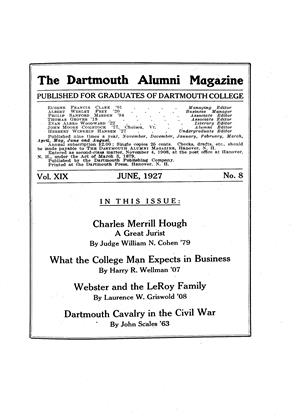What is to be the future attitude of the educated American man and woman toward religion and the Christian church? It is not a question easily answered, and it is possibly not one which can be discussed to advantage in the columns of such a publication as this; yet it appears to be a problem which presses increasingly with the years and in consequence is one which it may be found impossible to evade. One may dismiss at once, of course, any idea that forced reactions can restore the ideal which the more extreme Fundamentalists describe as "the old Religion," from which every scientific fact that is, or seems to be, in conflict with the more ancient theories of the Creation is barred by inexorable decree. The important question touches mainly the part which collegiate education can play, or ought to play, in dealing with the general faith of young men and women touching the more genuinely fundamental features of the Christian teachings.
For a long time this matter has been allowed to drift under a species of laissesfaire doctrine, which was very comfortable. Whether that is possible for many years more is rendered doubtful by the propensity of occasional teachers to enter the lists as active opponents of even a loosely defined religious faith, in what seems to be a very sincere conviction that combat is necessary to the maintenance of intellectual honesty. "It is as much my duty," was the recent dictum of an agnostic collegian, "to oppose what I regard as perfectly preposterous religious dogma, as it is the duty of priests and missionaries who entertain a contrary belief to argue for its acceptance." But is it ?
Dartmouth has suffered less from agitation of this kind than some other colleges ; indeed the men's colleges in general have felt the agitation far less noticeably than have the colleges devoted exclusively to the education of young women, although there has been some restiveness due to the growing abandonment of church and chapel requirements everywhere, especially among alumni who feel that this is the entering wedge of a positive atheism. The real complaint at present appears to center in a few institutions where instructors, more advanced and bolder than the rest, have sought without disguise to call in question the faith which students have brought with them from home rather than leave such matters to the slow development of individual perception.
One recognizes the temptation in such a case. The instructor, himself devoid of any definite faith and quite honestly convinced that the Christian church inculcates doctrines quite as untenable as a belief in Santa Claus, is often incapable of keeping this feeling out of his conferences. His power to refrain from undermining youthful beliefs, is likely to vary inversely with his predilection for the new and shocking in modern thought. It is one of the problems that seem more clearly inseparable from the newer sciences—if they are really sciences—which relate to speculations concerning human conduct; sociology, psychology and the like. To dissociate these from positive attack's on the traditional faith identified with the church is apparently difficult for all, and impossible to some. Hence the complaint, not always confined to alarmed parents, that college education tends increasingly to become "godless."
It would be ridiculous to pretend that the educated man or woman of mature years accepts today much that the educated men and women of forty years ago received with little conscious questioning; but it has yet to be established that modern thought is ready- to scrap the Christian church as a creed outworn, in the contemptuous fashion now so much in vogue among the younger intellectuals, of whose outgivings one hears occasional indignant complaints. There is room for the plea that it would be well to leave that matter alone and at one side, at least until those who reject the Christian doctrines can supply something which adequately takes their place. "A little learning may easily take one away from God, remarks some sage observer, "but a great deal of learning may as readily bring him back." It is the superficiality which sees in the faith of nearly twenty centuries only the quaint minutiae of creed that makes atheists out of agnostics.
Since men and women are so generally all at sea concerning things that lie beyond this visible world, it may be well to postpone for a season this supposed "duty" to teach the young student how preposterous is the faith of his fathers. It is doubtful that such teaching benefits the world in its present stage of development, or frame of mind. It satisfies the selfesteem of individuals to do it; but in the absence of any substitute to meet the implanted human instinct for the worship of something above and beyond what may be seen and proved, it seems a risky course to adopt. What we believe concerning such matters is certainly not what our grandparents believed, but it seems rash to inculcate the doctrine that an intelligent person may believe nothing at all beyond what smart young Intellectuals can teach him.
 View Full Issue
View Full Issue
More From This Issue
-
 Article
ArticleTHE UNDERGRADUATE CHAIR
June 1927 -
 Article
ArticleWHAT THE COLLEGE MAN EXPECTS IN BUSINESS
June 1927 By Harry R. Wellman '07 -
 Article
ArticleATHLETIC COUNCIL REPLIES TO PRESIDENT HOPKINS
June 1927 -
 Article
ArticleSECRETARIES ASSOCIATION MEETS IN HANOVER
June 1927 -
 Article
ArticleDARTMOUTH CAVALRY IN THE CIVIL WAR
June 1927 By John Scales '63 -
 Article
ArticleCAN CHINA SURVIVE
June 1927
Article
-
 Article
ArticleAlumni Fund Records 1915 to 1944
January 1945 -
 Article
ArticleCarol Service Resumed
January 1945 -
 Article
ArticleDartmouth Authors
March 1975 -
 Article
ArticleA Teacher of Many Pasts
May 1962 By GEORGE O'CONNELL -
 Article
ArticleForgotten?
December 1976 By JACK DEGANGE -
 Article
ArticleCONCLUSIONS AND A WARNING
April 1936 By William J. Minsch Jr. '36



